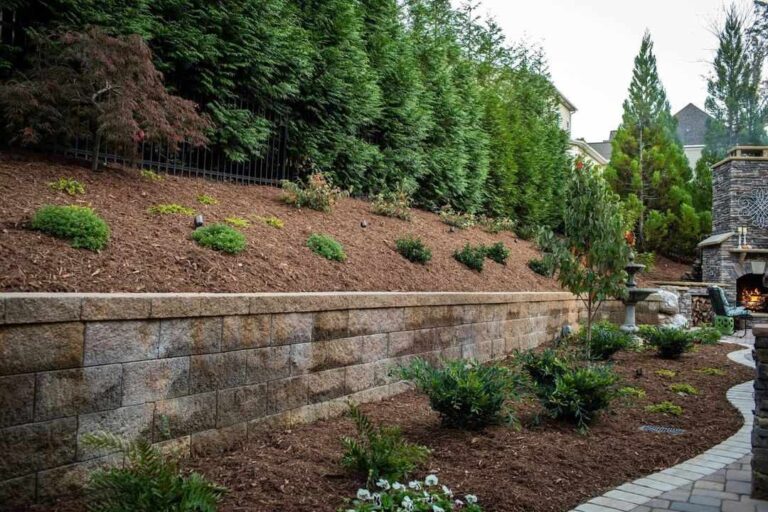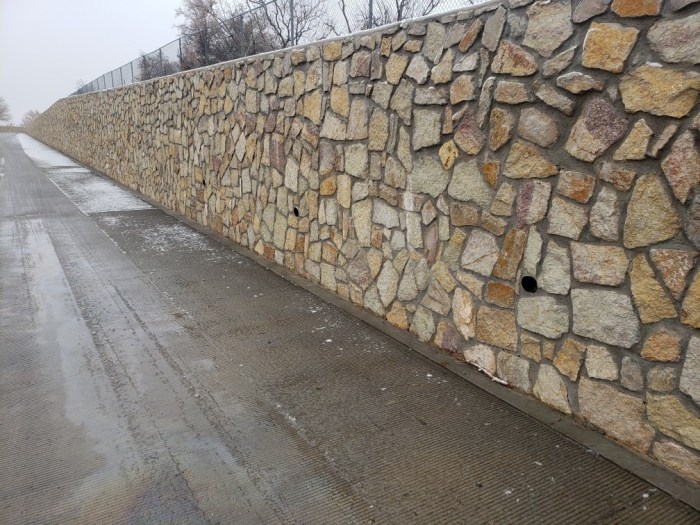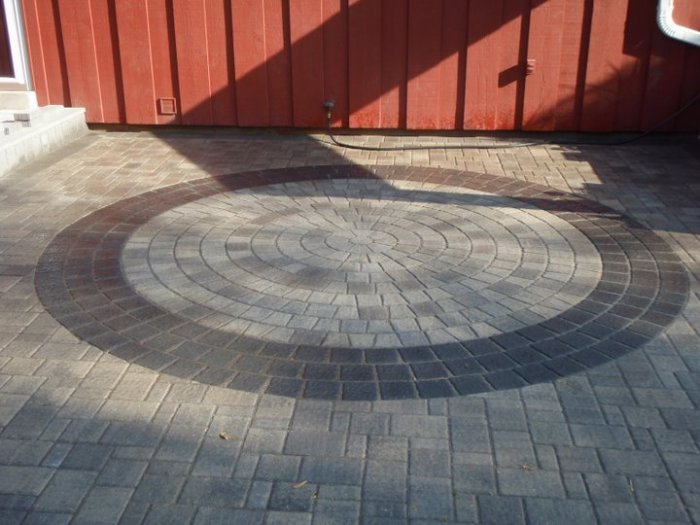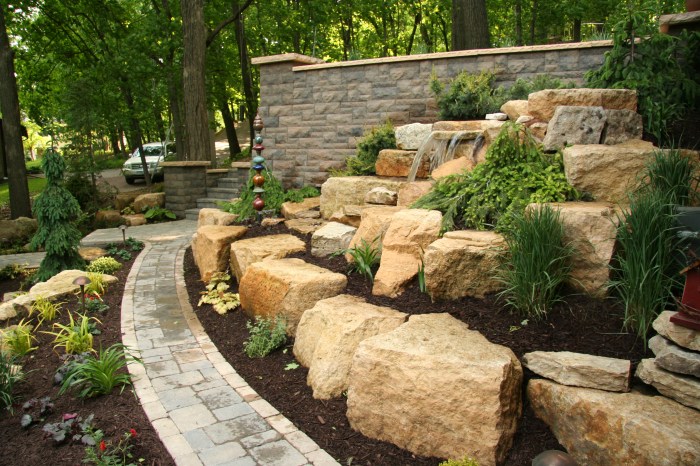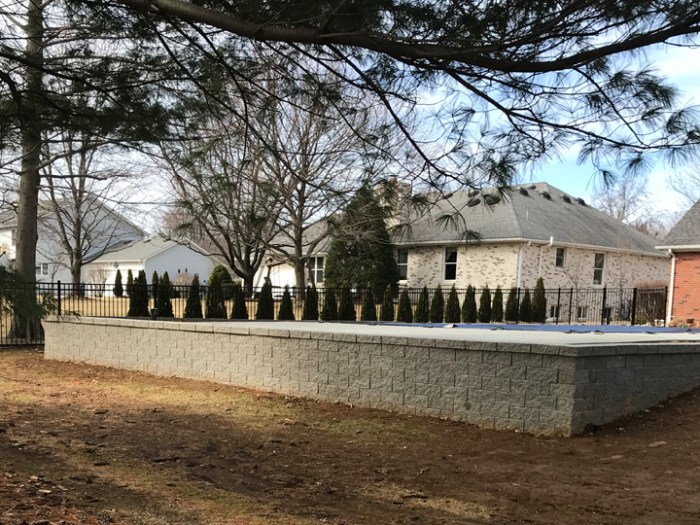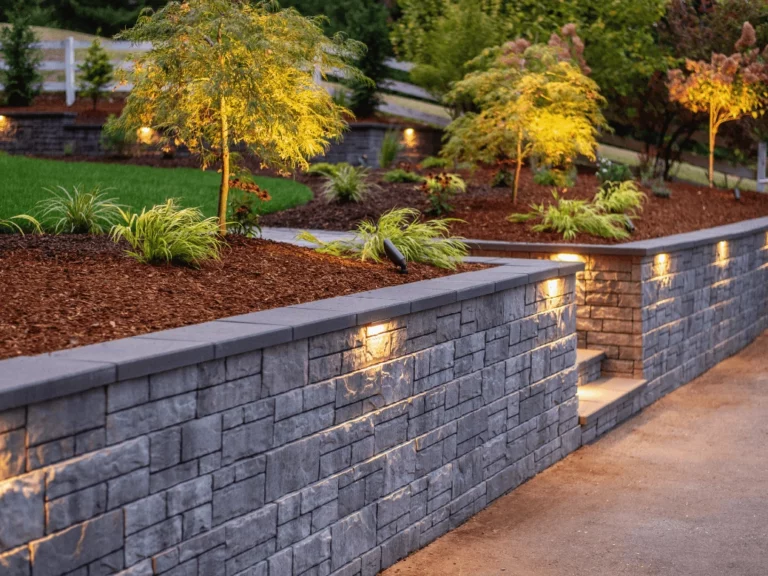Landscape Wall Contractors Near Me
Landscape wall contractors near me are crucial for transforming your outdoor space. They offer expert services in designing, constructing, and maintaining various types of landscape walls, from practical retaining walls to decorative accents. This guide provides a comprehensive overview, covering everything from finding qualified contractors to understanding project costs and specifications. You’ll learn about different wall types, materials, and crucial factors for successful projects.
We’ll delve into effective strategies for locating local contractors, analyzing their services and costs, and evaluating their performance. This will help you make informed decisions, ensuring a beautiful and well-maintained landscape wall that enhances your property’s appeal and functionality.
Defining Local Landscape Wall Contractors
Local landscape wall contractors are professionals specializing in the design, construction, and maintenance of walls within landscaping projects. They play a crucial role in defining the aesthetic and functional elements of outdoor spaces, from creating visually appealing features to managing soil erosion and providing support for plants. These contractors often work with homeowners, landscapers, and other construction professionals to bring their vision to life.
Landscape wall contractors handle a variety of tasks, from initial site assessments and design consultations to material procurement, construction, and post-installation maintenance. Their expertise spans various types of walls, materials, and construction techniques, ensuring a tailored approach to each project.
Types of Landscape Walls
Landscape walls come in diverse forms, each serving a specific purpose. Understanding these differences is crucial for selecting the right wall for your needs.
- Retaining Walls: These walls are primarily functional, designed to hold back soil on sloped or uneven terrain. They prevent landslides and soil erosion, creating level areas for planting and other landscaping activities. Retaining walls are essential for maximizing usable space and creating stable environments.
- Decorative Walls: These walls are aesthetically driven, adding visual interest and character to a landscape. They can feature intricate designs, unique materials, and artistic details to complement the surrounding elements. Decorative walls can create focal points, define spaces, and enhance the overall beauty of the landscape. They may incorporate elements like stonework, brickwork, or custom designs.
- Dry-Stacked Walls: These walls are constructed using stacked stones or other materials without mortar or cement. The stones are carefully fitted together, relying on gravity and the stones’ interlocking shapes for stability. Dry-stacked walls often have a rustic, natural aesthetic and are a sustainable option due to the minimal use of binding materials. This approach emphasizes the natural beauty of the materials used.
Materials Used in Landscape Wall Construction
The choice of materials significantly impacts the wall’s aesthetics, durability, and cost. Different materials offer various benefits and drawbacks.
- Stone: Natural stone, like granite, sandstone, or limestone, offers a wide range of colors, textures, and patterns, lending a timeless aesthetic to the landscape. Stone walls are durable and require minimal maintenance. However, the cost can vary considerably depending on the type and availability of the stone. Consider the durability and maintenance required for a long-term project.
- Concrete: Concrete walls are known for their strength and versatility. They can be molded into various shapes and sizes, providing a reliable and cost-effective solution. The color and texture can be customized with staining or painting. Concrete’s durability and longevity make it a popular choice for retaining walls.
- Brick: Brick walls are durable and provide a traditional aesthetic. They are available in various colors and textures, allowing for customized designs. Brick’s strength and longevity make it a good choice for retaining walls and decorative walls. The aesthetic appeal is a key factor in the choice.
- Wood: Wood walls can create a warm and natural look, though they may require more maintenance than other materials. Properly treated wood can provide a durable solution, particularly in decorative walls or specific situations where wood is the desired material.
Identifying Qualified Landscape Wall Contractors
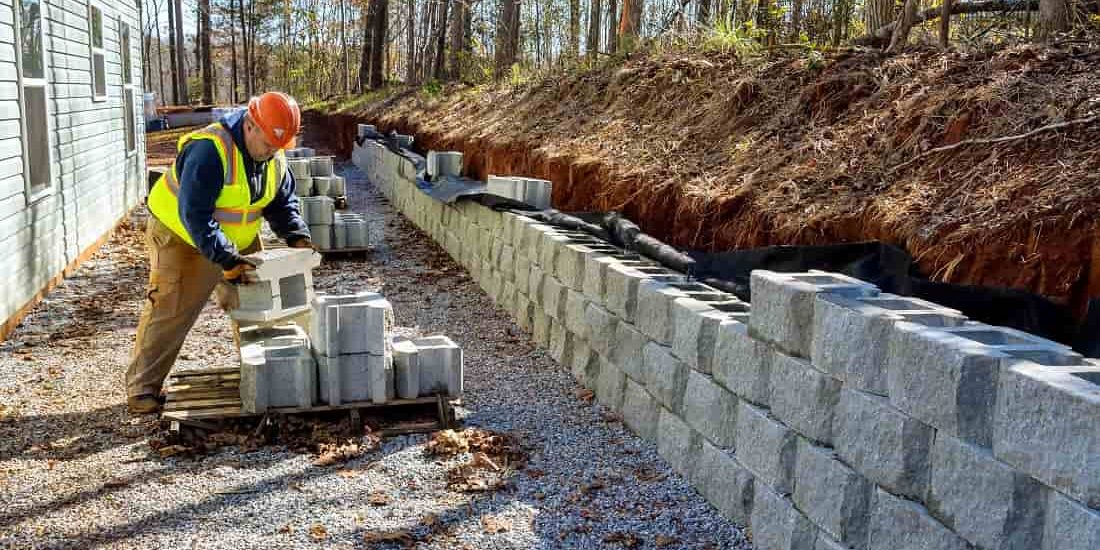
Several factors can help identify a qualified contractor:
- Experience: Look for contractors with a proven track record in landscape wall construction. Check for examples of past projects, testimonials, and references from satisfied clients.
- Licensing and Insurance: Ensure the contractor holds the necessary licenses and carries appropriate liability insurance to protect you in case of accidents or damage during the project. Verify these credentials.
- Portfolio: A portfolio of past projects showcases the contractor’s expertise and design capabilities. Review these projects to assess their ability to meet your specific needs.
- Communication: Choose a contractor who effectively communicates their understanding of your project goals and expectations. A clear and responsive contractor is essential.
Examples of Successful Landscape Wall Projects
Successful landscape wall projects often incorporate innovative design elements and sustainable practices. For instance, a retaining wall constructed with local stone blends seamlessly with the surrounding environment. Another example is a decorative wall featuring custom brickwork, creating a focal point in the garden. Careful planning and execution are key to a successful outcome.
Comparison of Landscape Wall Types
| Wall Type | Materials | Estimated Costs | Maintenance Requirements |
|---|---|---|---|
| Retaining Wall (Stone) | Stone (e.g., granite, sandstone) | Moderate to High | Low to Moderate (periodic inspection and repair) |
| Decorative Wall (Brick) | Brick, stone | Moderate to High | Low to Moderate (periodic cleaning and repair) |
| Dry-Stacked Wall (Stone) | Stone | Low to Moderate | Low (occasional inspection) |
Finding Contractors Near Me
Finding the right landscape wall contractor is crucial for a successful project. This involves careful consideration of location, expertise, and reputation. Effective strategies for locating qualified contractors in your area are essential to ensure the project meets your expectations.
Effective Strategies for Locating Contractors
Locating landscape wall contractors near you requires a strategic approach. Start by identifying potential contractors within your desired geographic area. Proximity is key, as it minimizes travel time and associated costs. Thorough research and due diligence are important steps in selecting the ideal contractor.
Methods to Locate Local Contractors
Various methods can be employed to find local contractors specializing in landscape walls. Online search engines, such as Google, can yield a list of potential contractors. Reviewing websites dedicated to local businesses can provide valuable insights into contractor profiles, reviews, and portfolios. Networking with local home improvement professionals or contacting related organizations can help connect you with potential contractors. Referrals from trusted sources are also a viable option.
Importance of Considering Location and Proximity
Proximity is a critical factor in selecting a landscape wall contractor. Consider travel time, potential logistical challenges, and overall project efficiency. A contractor’s proximity can impact the project’s timeline and budget. Factors like the contractor’s accessibility for project visits and potential issues related to material delivery should be considered.
Online Resources and Platforms for Local Contractors
Numerous online resources can help you find landscape wall contractors. Online business directories, such as Yelp or Angie’s List, often feature contractor listings with reviews and ratings. Social media platforms can also be used to connect with potential contractors and gain insights into their work. Professional networking sites for contractors may provide a list of qualified individuals in your area. Specialized platforms dedicated to landscaping or construction projects often have contractor listings.
Contractor Selection Criteria
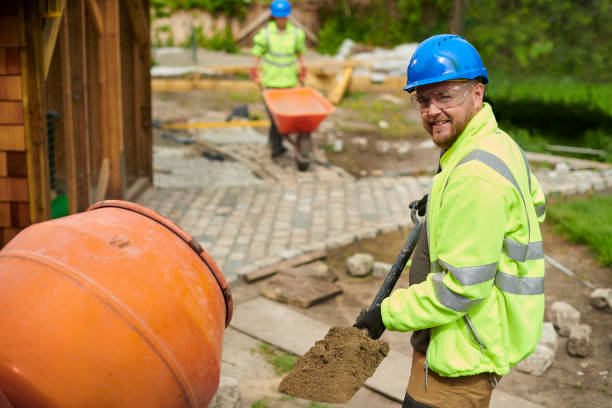
Selecting a landscape wall contractor requires careful consideration of various criteria. Experience, particularly in constructing landscape walls, is a crucial factor. Positive reviews and testimonials from previous clients offer insights into the contractor’s work ethic and quality of service. Insurance coverage is essential to protect your interests in case of accidents or damages during the project. Ensure the contractor is properly insured, as this is a safeguard against unforeseen circumstances. The contractor’s pricing structure should be carefully evaluated, considering the scope of the work and the materials used.
Local Landscape Wall Contractors
| Contractor Name | Specialties | Contact Information |
|---|---|---|
| Acme Landscape Solutions | Retaining walls, stone walls, decorative walls | (123) 456-7890, acmelandscapes@email.com |
| GreenThumb Walls | Concrete walls, natural stone walls, and design consultations | (987) 654-3210, greenthumbwalls@email.com |
| Stone Masters | Custom stone walls, brick walls, and restoration services | (555) 123-4567, stonemasters@email.com |
| WallCraft Inc. | Landscaping, retaining walls, decorative accents | (111) 222-3333, wallcraftinc@email.com |
Contractor Services and Costs
Landscape wall contractors offer a range of services beyond simply building a wall. They typically handle the entire process, from initial design and material selection to construction and final cleanup. Understanding the scope of services and associated costs is crucial for homeowners planning a landscape wall project.
Landscape wall projects encompass a comprehensive set of tasks, often requiring specialized expertise. This includes site assessment, detailed design plans, material sourcing, construction, and post-construction cleanup. Different contractors may handle varying aspects of the project, and the scope of work should be clearly Artikeld in a contract before commencing.
Typical Contractor Services
A comprehensive list of services provided by landscape wall contractors typically includes design consultation, material procurement, site preparation, wall construction, and post-construction clean-up. Some contractors may also offer related services, such as retaining wall design or landscaping around the completed wall. These additional services add value to the project by ensuring a cohesive and aesthetically pleasing final product.
Project Design and Planning
The design phase is critical to a successful landscape wall project. It involves site evaluation, determining the appropriate wall type and height, and integrating the wall seamlessly into the existing landscape. A detailed design plan is essential for proper material selection and accurate cost estimation. The plan should include dimensions, materials, and construction details.
Material Selection
Choosing the right materials is paramount. Factors such as durability, aesthetics, and cost play a role. Common materials for landscape walls include concrete, stone, brick, and wood. The selection process often involves discussions between the homeowner and the contractor, considering budget constraints and desired aesthetics.
Construction Process
The construction process involves several key steps. Site preparation, foundation work, wall erection, and finishing touches are all part of the construction process. The specific steps depend on the complexity and size of the project. Detailed timelines and construction plans are crucial to ensure the project progresses efficiently and meets the homeowner’s expectations.
Pricing Structures
Pricing structures for landscape wall installations can vary significantly. Many contractors use a combination of material costs, labor rates, and project complexity to determine the overall cost. Some may offer fixed-price contracts, while others use an hourly or daily rate.
Project Cost Examples
A small, simple stone wall, approximately 6 feet long and 3 feet high, might cost between $2,000 and $4,000. A larger, more complex concrete retaining wall, 15 feet long and 8 feet high, could range from $5,000 to $10,000 or more, depending on complexity and materials. These estimates are just starting points, and the final cost depends on numerous factors.
Factors Affecting Project Costs
| Factor | Description |
|---|---|
| Material Costs | The price of materials like stone, concrete, or brick significantly impacts the overall cost. |
| Labor Rates | Hourly wages for construction workers are a major cost component. |
| Project Complexity | The size, design, and construction methods influence the project’s cost. |
| Site Conditions | Uneven terrain or challenging access points add to the project’s cost. |
| Permitting Fees | Local regulations may require permits, which increase the project cost. |
| Design Consultation | Professional design services can impact the overall cost. |
| Material Quantity | The amount of material needed directly affects the cost. |
Project Timelines
Project timelines vary depending on the size and complexity of the project. A simple, small wall might take a few days to complete, while a larger, more complex retaining wall could take several weeks. Factors like weather conditions, material availability, and the contractor’s workload also affect project timelines. The timeline should be communicated and agreed upon in the contract.
Understanding Project Specifications
Planning a landscape wall project requires careful attention to detail. A well-defined project specification is crucial for a smooth execution and a final product that meets your expectations. This section delves into the key elements of a successful landscape wall project, from contract specifics to design considerations.
Essential Elements of a Landscape Wall Project Contract
A comprehensive contract is the bedrock of any successful project. It articulates the agreed-upon terms and conditions, protecting both the client and the contractor. Key elements include a clear description of the project scope, including materials, dimensions, and specific design elements. Detailed timelines and payment schedules should also be explicitly stated. Finally, warranties and dispute resolution procedures should be addressed.
Importance of Detailed Project Specifications
Detailed project specifications prevent misunderstandings and costly revisions later in the project. A well-defined scope of work ensures that the final product aligns with the initial vision. It also helps to avoid disputes regarding materials, labor, or timelines. These specifications form the basis for accurate cost estimations and serve as a reference point throughout the project lifecycle.
Key Elements to Include in a Landscape Wall Project Contract
- Project Scope: A precise description of the wall’s dimensions, materials, and design features, including specific details about the foundation, height, and any decorative elements.
- Timeline: A detailed schedule outlining key milestones, such as site preparation, material delivery, construction phases, and completion dates.
- Payment Schedule: A clear breakdown of payment amounts and due dates, including percentages for progress payments or a final payment upon project completion.
- Materials: A list of all materials to be used, including their specifications (e.g., type of stone, concrete mix), sourcing, and quality assurance measures.
- Warranties: Information on the contractor’s warranties for materials and workmanship, including the duration and scope of coverage.
- Dispute Resolution: A procedure for resolving any disagreements or disputes that may arise during the project.
Significance of Obtaining Multiple Quotes
Getting multiple quotes from different contractors is essential for informed decision-making. This allows you to compare pricing, project timelines, and contractor experience. This comparison process can help you choose a contractor whose approach best aligns with your budget and project goals. It’s also an opportunity to understand various approaches and potential solutions to your project.
Important Factors to Consider When Choosing a Design for Your Landscape Wall
Choosing a design involves careful consideration of aesthetics, functionality, and integration with the existing landscape. The style of the wall should complement the surrounding environment. Consider the wall’s intended use, such as a boundary marker, retaining structure, or decorative element. The choice of materials should also consider factors such as durability, maintenance requirements, and the desired aesthetic.
Essential Aspects of a Landscape Wall Project Contract
| Aspect | Description |
|---|---|
| Timeline | Specific dates for site preparation, material delivery, construction phases, and project completion. |
| Payment Schedule | Breakdown of payment amounts and due dates (e.g., progress payments, final payment). |
| Warranty Information | Details on the contractor’s warranty for materials and workmanship, including duration and scope of coverage. |
| Dispute Resolution | Procedure for resolving disagreements or disputes during the project. |
Design Elements for Landscape Walls
| Element | Aesthetics | Functionality | Integration |
|---|---|---|---|
| Material | Stone, brick, and concrete | Strength, durability, and water resistance | Complementing existing landscaping features |
| Height | Low, medium, high | Retaining, defining space | Maintaining sightlines and views |
| Style | Modern, traditional, rustic | Supporting soil, preventing erosion | Blending seamlessly with the surroundings |
Evaluating Contractor Performance

Source: website-files.com
Choosing the right landscape wall contractor is crucial for a successful project. Thorough evaluation of potential contractors goes beyond simply comparing prices. It involves assessing their abilities, experience, and commitment to delivering a quality product. This evaluation process ensures a smooth project execution and a lasting, beautiful landscape feature.
Evaluating a contractor’s performance involves a multifaceted approach, looking at their communication, professionalism, work quality, experience, and reputation. A well-structured evaluation process helps identify potential problems early and mitigate risks, leading to a more satisfying and predictable outcome.
Crucial Aspects of Contractor Evaluation, Landscape wall contractors near me
A comprehensive evaluation considers several key aspects, ensuring that a contractor aligns with project needs and expectations. Communication and professionalism set the tone for the entire project, while work quality is paramount for achieving the desired aesthetic and functionality. Experience and reputation provide insight into the contractor’s past performance and reliability.
Importance of Communication and Professionalism
Effective communication is vital throughout the project lifecycle. Clear and prompt responses to inquiries, adherence to agreed-upon timelines, and transparency regarding project updates are crucial elements of professionalism. A contractor who communicates effectively and maintains a professional demeanor fosters trust and reduces potential misunderstandings. This ensures a positive working relationship and contributes significantly to project success.
Assessing Work Quality
Evaluating work quality involves examining several factors. First, verify that the contractor adheres to the agreed-upon specifications. Second, inspect the materials used for quality and durability. Third, scrutinize the craftsmanship and attention to detail in the construction process. Finally, consider the overall aesthetic appeal and functionality of the completed landscape wall. Taking photos and making detailed notes during the construction process is beneficial.
Evaluating Experience and Reputation
Contractor experience and reputation provide valuable insights into their capabilities. Look for a contractor with a proven track record in similar projects. Checking online reviews and testimonials from past clients is essential. Previous projects should demonstrate the contractor’s expertise and adherence to quality standards. You can also ask for portfolios or examples of past work.
Obtaining References and Feedback
References and feedback from previous clients provide crucial insights into a contractor’s performance. Requesting references allows you to verify the contractor’s claims and assess their reliability. Gathering feedback from past clients offers firsthand accounts of their experiences, including punctuality, communication, and work quality. This real-world perspective is invaluable in making an informed decision.
Essential Criteria for Evaluating Contractor Performance
| Criteria | Description | Importance |
|---|---|---|
| Punctuality | Adherence to scheduled appointments and project timelines. | Demonstrates reliability and respect for time. |
| Communication | Clear, prompt, and transparent communication throughout the project. | Builds trust and reduces misunderstandings. |
| Work Quality | Meticulous craftsmanship, adherence to specifications, and use of quality materials. | Ensures a durable and aesthetically pleasing final product. |
| Experience | Proven track record in similar projects, demonstrated expertise. | Indicates the contractor’s ability to handle the scope of the project. |
| Reputation | Positive feedback and testimonials from previous clients. | Indicates the contractor’s reliability and work quality. |
Potential Problems and Resolutions
| Potential Problem | Description | Resolution |
|---|---|---|
| Material Defects | Issues with the quality or suitability of materials used in the construction. | Negotiate the replacement or repair of defective materials. Review contracts and specifications for recourse. |
| Time Delays | Unforeseen circumstances are causing project completion to extend beyond the agreed-upon timeline. | Discuss potential extensions or renegotiate timelines. Identify and address the cause of the delay. |
| Communication Breakdown | Lack of clarity or insufficient communication between the contractor and client. | Establish clear communication channels. Document all agreements and instructions. |
| Quality Issues | Substandard workmanship or deviation from agreed-upon specifications. | Document discrepancies, address concerns, and agree on corrective actions. Involve a third party, such as an architect, if needed. |
Illustrative Project Examples: Landscape Wall Contractors Near Me
Choosing the right landscape wall design involves considering various factors, from the desired aesthetic to the practical needs of the space. Understanding the different types of projects and their associated challenges is crucial for a successful outcome. This section presents diverse examples, highlighting different styles and considerations.
Various landscape wall projects cater to diverse needs and preferences. Each design presents unique challenges and solutions, contributing to a well-integrated and aesthetically pleasing outdoor environment.
Residential Landscape Walls
Residential landscape walls often incorporate privacy, visual interest, and functional elements like retaining the soil. Consider a project featuring a low retaining wall made of stacked stone. This wall separates a garden from a patio area, creating a defined space. The stone is locally sourced, blending seamlessly with the surrounding natural environment. The project required careful grading to ensure proper drainage and prevent water damage. This wall not only offers privacy but also provides support for climbing plants, further enhancing the aesthetic appeal. Another example might be a modern, contemporary wall built from concrete blocks. This wall defines a seating area, with built-in planters and seating ledges. The sleek lines and neutral color palette complement the minimalist design of the house.
Commercial Landscape Walls
Commercial landscape walls serve a multitude of purposes, including defining property boundaries, enhancing aesthetics, and supporting landscaping elements. Imagine a wall built around a restaurant patio, using weathered wood planks. This wall provides privacy and a sense of enclosure, while allowing natural light to filter through. The wall also serves as a decorative element, drawing the eye and setting a welcoming atmosphere. A different example might involve a high retaining wall built from concrete blocks, designed to support a significant elevation change and provide a sturdy barrier. This wall is integral to the overall design of a multi-level parking lot. Careful engineering and precise construction were required to ensure structural integrity and safety.
Retaining Wall Projects
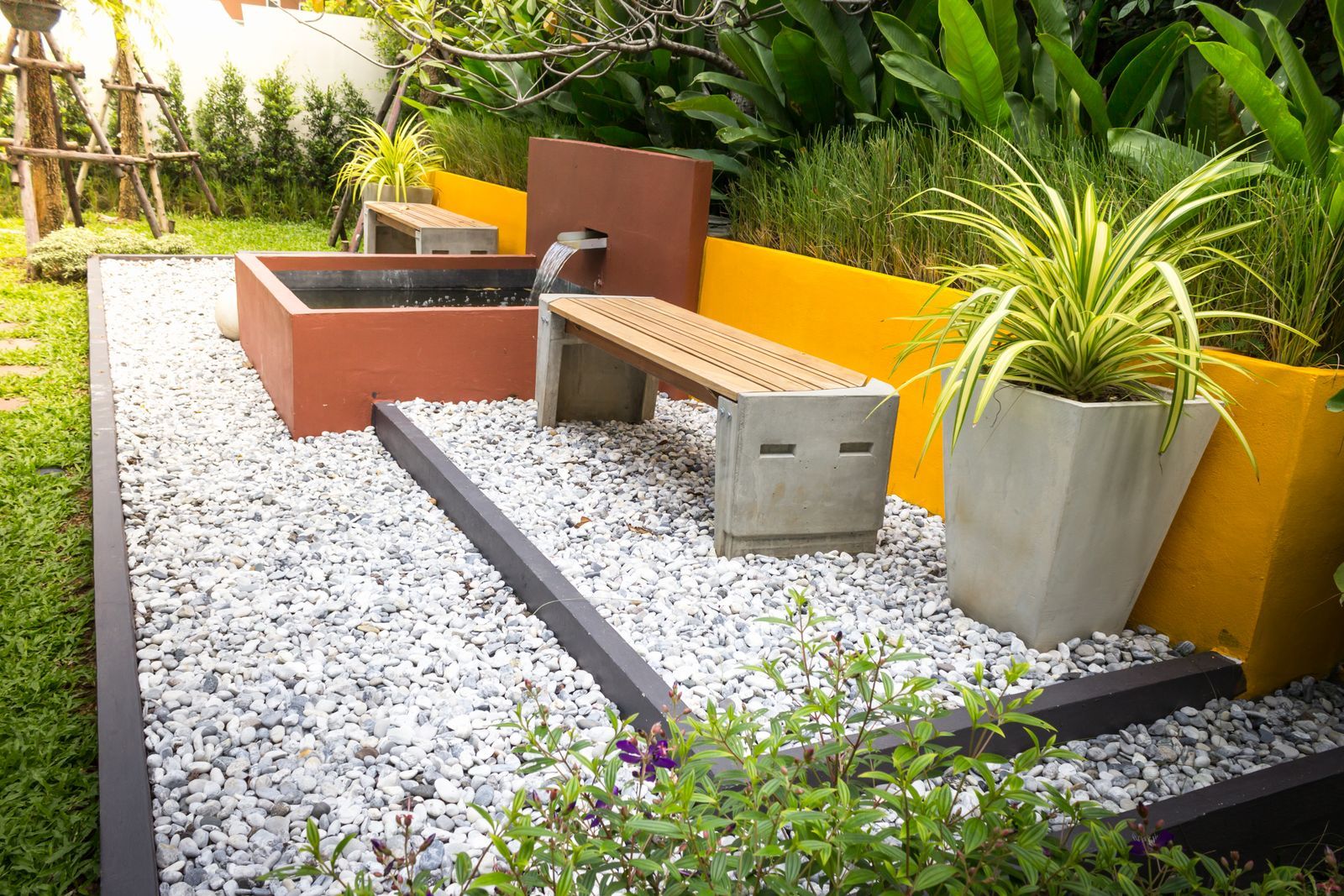
Retaining walls are essential for managing slopes and uneven terrain. A project might involve a tiered retaining wall made from natural stone, creating a series of terraces. The wall’s design incorporates a series of steps, providing varied levels for planting and viewing. Careful consideration of drainage and erosion control was paramount. This wall blends harmoniously with the natural topography. Another example could be a modern, concrete retaining wall with integrated irrigation systems, designed to support a garden with drought-tolerant plants. The project addressed water management concerns, showcasing a sustainable design approach.
Specific Wall Materials and Styles
Different materials and styles offer various aesthetics and functional benefits. A stone wall project might utilize locally sourced flagstone, creating a rustic and natural look. This style often blends seamlessly with the surrounding landscape, but requires precise alignment and stone selection. A modern wall, constructed from poured concrete, provides a clean and contemporary aesthetic. The smooth surface allows for integrated lighting and subtle landscaping features. This design is perfect for modern homes or commercial spaces.
| Wall Style | Key Features | Benefits |
|---|---|---|
| Stacked Stone | Natural, rustic look; locally sourced materials | Durable, blends with natural surroundings; potentially cost-effective |
| Concrete Block | Modern, contemporary style; strong and durable | Versatile, adaptable to various designs; relatively affordable |
| Weathered Wood | Rustic, natural, warm aesthetic; organic look | Durable, eco-friendly, and adds a unique visual appeal |
| Poured Concrete | Sleek, contemporary, customizable | Strong, durable, and can incorporate features like integrated lighting |
Closure
In conclusion, finding the right landscape wall contractors near you is a significant step in enhancing your outdoor living space. This guide has provided a detailed overview of the process, equipping you with the knowledge to identify qualified contractors, understand project costs and specifications, and evaluate their performance. By considering the factors Artikeld, you can confidently select the perfect contractor for your project, ensuring a successful and satisfying outcome.
